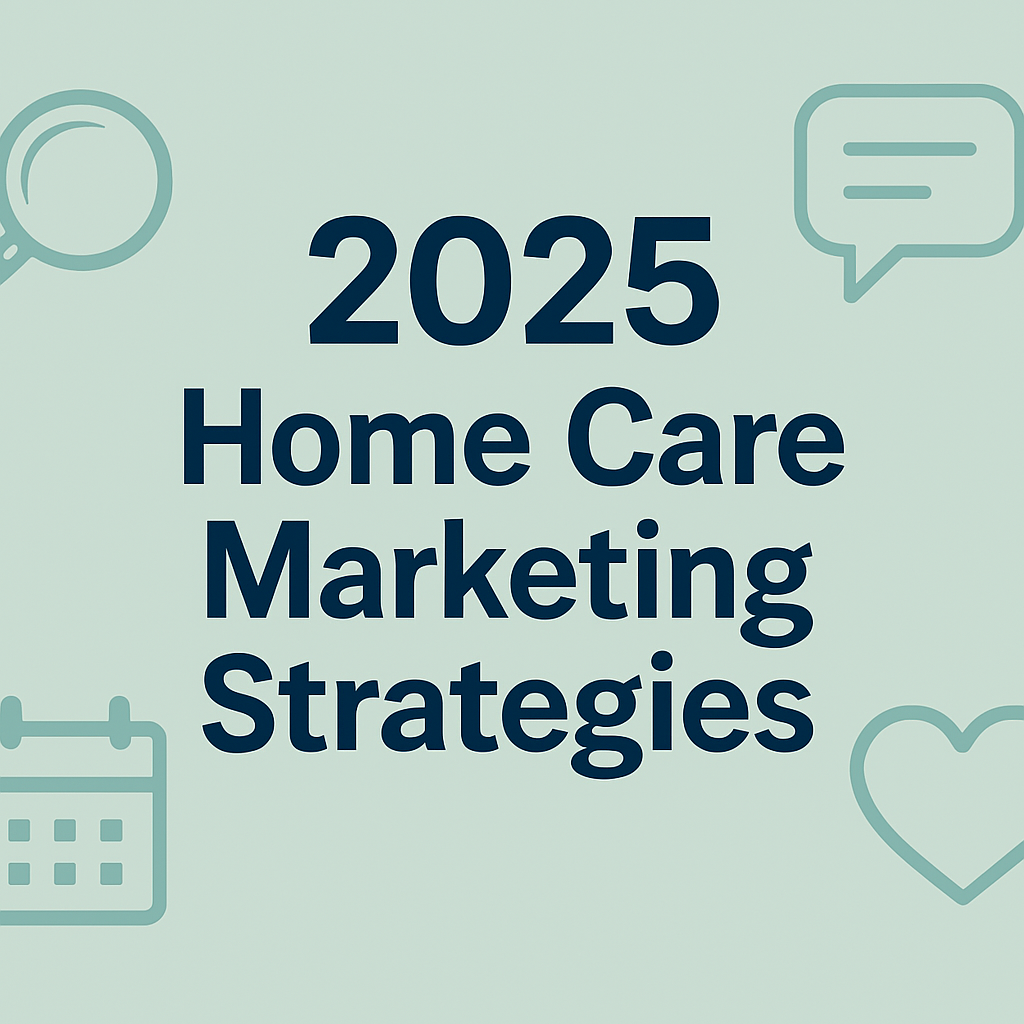
15 Proven Home Care Marketing Strategies That’ll Help You Attract More Clients in 2025
Running a home care agency is very rewarding but not without its challenges. Between coordinating caregiver schedules, ensuring top-quality services, and keeping up with regulations, marketing can feel like an overwhelming extra task. However, without effective home care marketing strategies, even the best home care services can struggle to grow.
In fact, client turnover in home care hit about 79.2% in 2024, a five-year high, meaning agencies must constantly find new clients just to maintain growth.
The good news is that you don’t need a massive budget or a marketing degree to attract clients. What you need is a smart mix of home care marketing strategies.
Strategies that build trust, raise your local visibility, and tap into the networks you already have.
Below, we closely examine 15 proven home care marketing strategies that come from leading industry experts, new research, and tried-and-true best practices.
Let’s explore how you can effectively market your home care business, meet people where they are, and ultimately reach more families who need your support.
1. Leverage Referrals from Satisfied Clients
Nothing beats word-of-mouth referrals from happy clients when it comes to growing a home care business. According to the 2020 Home Care Benchmarking Study, current and past clients are the number one source of new referrals for agencies. In other words, your existing clients are a goldmine of potential leads.
It makes sense that the Nielsen survey found that 92% of consumers trust recommendations from people they know more than any form of advertising. Home care, being a highly personal service, is especially driven by trust and personal experience.
So, how can you encourage more client referrals?
-
Provide outstanding care and clear communication.
Satisfied clients who feel valued are naturally more likely to recommend you. Marketing author Seth Godin famously said, “People do not buy goods and services. They buy relations, stories, and magic.” In home care, the “magic” is the genuine compassion and reliability you deliver.
-
Ask directly but naturally.
Many agencies simply ask (people often won’t think to do it on their own). For example, after a few months of service or upon positive feedback, you might say, “We’re so glad to hear you’re happy. If you know anyone else who could use help at home, please let them know about us.” This simple prompt can plant the seed for referrals.
-
Implement a referral program.
Reward clients who refer new business (Be sure to check state regulations for compliance.) Many agencies report that client referrals account for around 73% of their annual revenue. This is a huge contribution you can’t afford to miss.
-
Make it easy for clients to refer you.
Provide extra business cards, brochures, or an email they can forward to others. When a referral comes in, personally thank the referring client with a handwritten note or a phone call to show appreciation.
2. Build Partnerships with Healthcare Professionals

Beyond clients themselves, some of your best home care marketing strategies referral sources will be local healthcare professionals. Building a referral network in the healthcare community can provide a steady stream of client leads.
Consider the many professionals who interact with your potential clients:
-
Doctors (especially geriatric physicians and house-call doctors)
-
Hospital discharge planners
-
Social workers
-
Rehabilitation therapists
-
Home health agency nurses
-
Hospice providers
-
Clergy and senior center directors
These professionals often know when a patient or community member can no longer fully manage at home and needs extra help, which is where your services come in.
3. Optimize Your Google My Business Listing
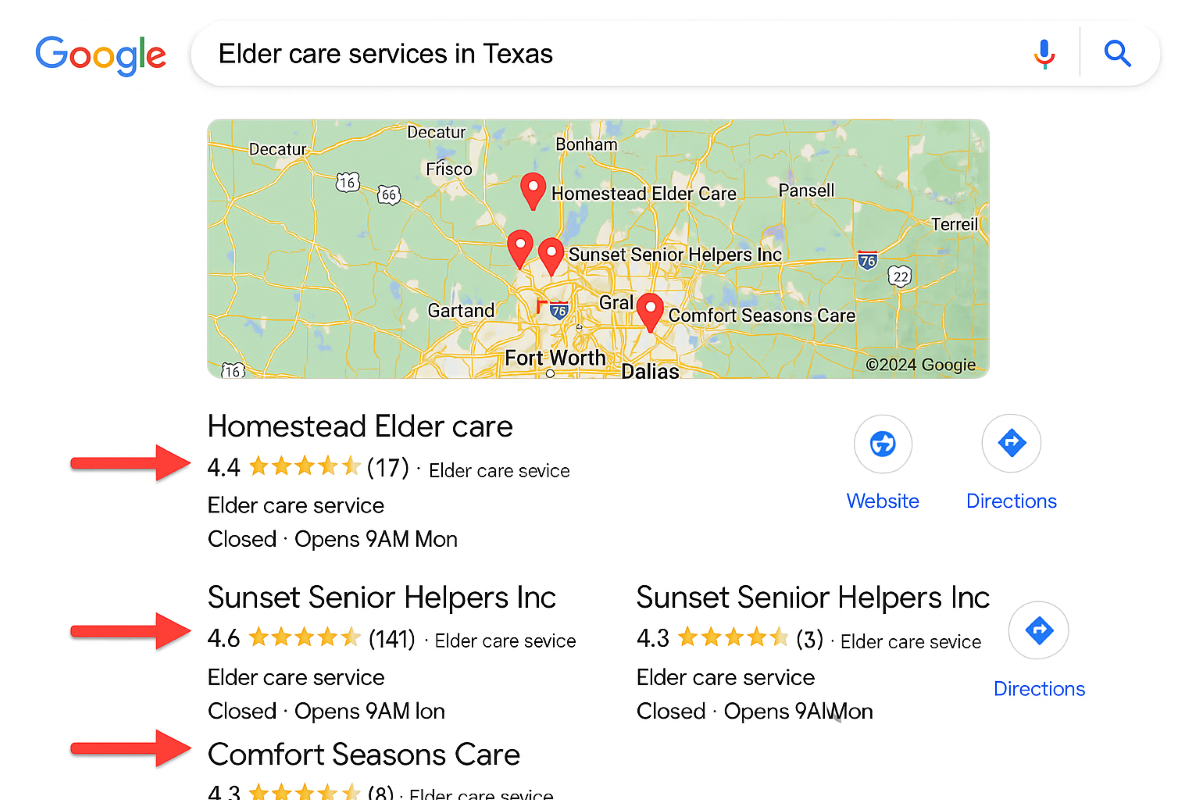
When families in your area search online for “home care near me” or “elder care services in Texas”, appearing top in those local search results is very important. One of the most powerful (and free!) tools for local visibility is your Google My Business (GMB) profile.
If you haven’t claimed and fully filled out your GMB listing yet, that should jump to the top of your to-do list. Google My Business is what allows your agency to show up in Google Maps results. It is one of the easiest wins for local home care marketing.
Now, you might be wondering, how can I make the most of Google My Business? We’ve got you.
-
Claim and complete your profile:
Ensure your business name, address, and phone number (NAP details) are accurate and consistent across all platforms.
-
Provide detailed, up to date business information:
Add your website URL, business hours, and a description of your services. The more complete your profile, the more trustworthy it appears to potential clients.
-
Upload high-quality photos:
Listings with photos receive 42% more requests for driving directions and are twice as likely to be seen as reputable by consumers. Upload your logo and add images of your caregivers, office, and community involvement.
-
Enable direct contact options:
Ensure your phone number is correct so prospects can easily tap “Call” on mobile searches. If you can respond promptly, activate the messaging feature.
-
Encourage client reviews:
The more positive Google reviews you have, the higher your credibility. Ask satisfied clients or family members to leave a review and respond to each one professionally.
4. Strengthen Your Local SEO (Search Engine Optimization)
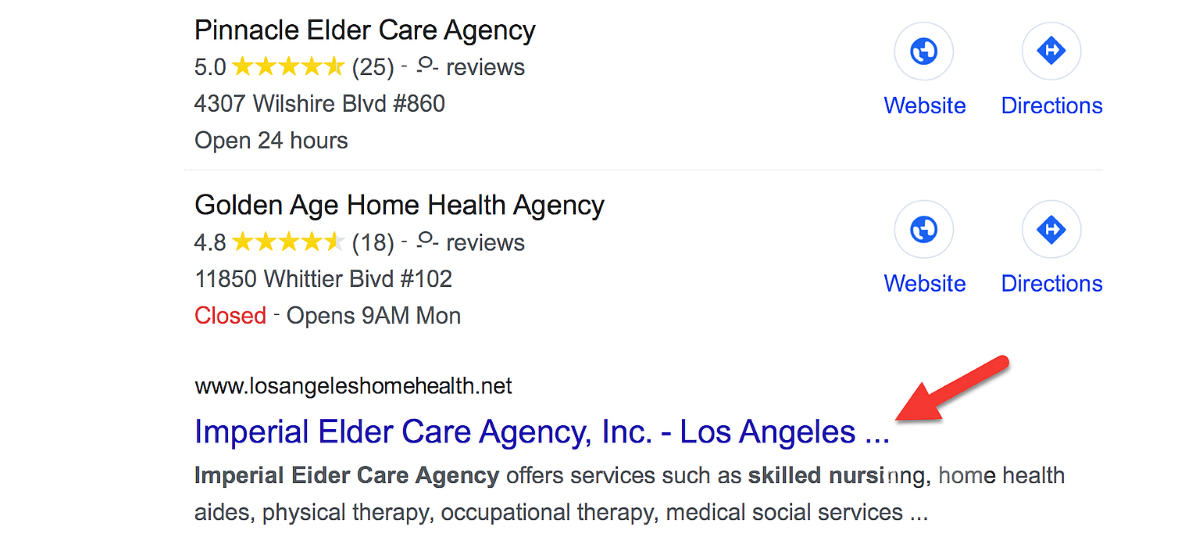
Optimizing your online presence doesn’t stop at Google My Business. You’ll want to make sure your home care agency’s website itself is also ranking well in search results. This is where home care marketing strategies that focus on Search Engine Optimization (SEO) come in.
SEO simply means aligning your website with the terms people are searching for, and ensuring your site provides a good user experience.
Done right, organic SEO can very well expand your number of clients because the higher your site ranks on Google, the more inquiries you’re likely to get
Here’s how you can go about SEO.
-
Use location-specific keywords: Include your city or region in title tags, headings, and page content (e.g., “Trusted In-Home Senior Care in Texas”).
-
Ensure NAP consistency: Your business name, address, and phone number (NAP) must match exactly across social platforms and online directories.
-
Optimize meta descriptions and title tags: Write unique, keyword-rich meta descriptions for each page to improve click-through rates.
-
Improve site speed and mobile experience: A slow website or one that’s hard to navigate on mobile devices can hurt rankings. Ensure your site loads quickly and is mobile-friendly.
5. Educate Prospects through Consistent Blogging
Content marketing is a powerful yet often underused home care marketing strategy. Families searching for care have many questions, and blogging allows you to answer those questions while positioning your agency as a trusted resource.
How can you use blogging to attract clients?
-
Write about topics families are searching for.
Address common concerns like “How to Convince a Parent to Accept Home Care” or “Home Care vs. Assisted Living: What’s the Best Choice?”
-
Post consistently.
Whether it’s weekly or twice a month, a steady flow of content helps boost SEO and keeps your audience engaged.
-
Monitor what works.
Track which blog posts get the most traffic. If one topic is popular, consider expanding it into a video, webinar, or downloadable guide.
6. Engage on Social Media to Build Your Community
A strong social media presence helps home care agencies connect with families, showcase expertise, and build trust. Since many decision-makers are adult children in their 50s or 60s, platforms like Facebook, Instagram, and LinkedIn can be effective for reaching them.
Here’s how to use social media to grow your agency.
-
Create a Facebook Business Page:
Keep it updated with caregiver spotlights, client success stories (with permission), and helpful caregiving tips.
-
Share valuable and engaging content:
Post about home care advice, senior safety tips, and agency updates. Use images, videos, and infographics to make posts more appealing.
-
Be active in community groups:
Join local Facebook groups where people discuss senior care. Answer questions and be a resource without being overly promotional.
-
Leverage live videos:
Host Q&A sessions or short educational talks to establish authority and engage directly with potential clients.
7. Invest in Your Online Reputation (Reviews & Testimonials)
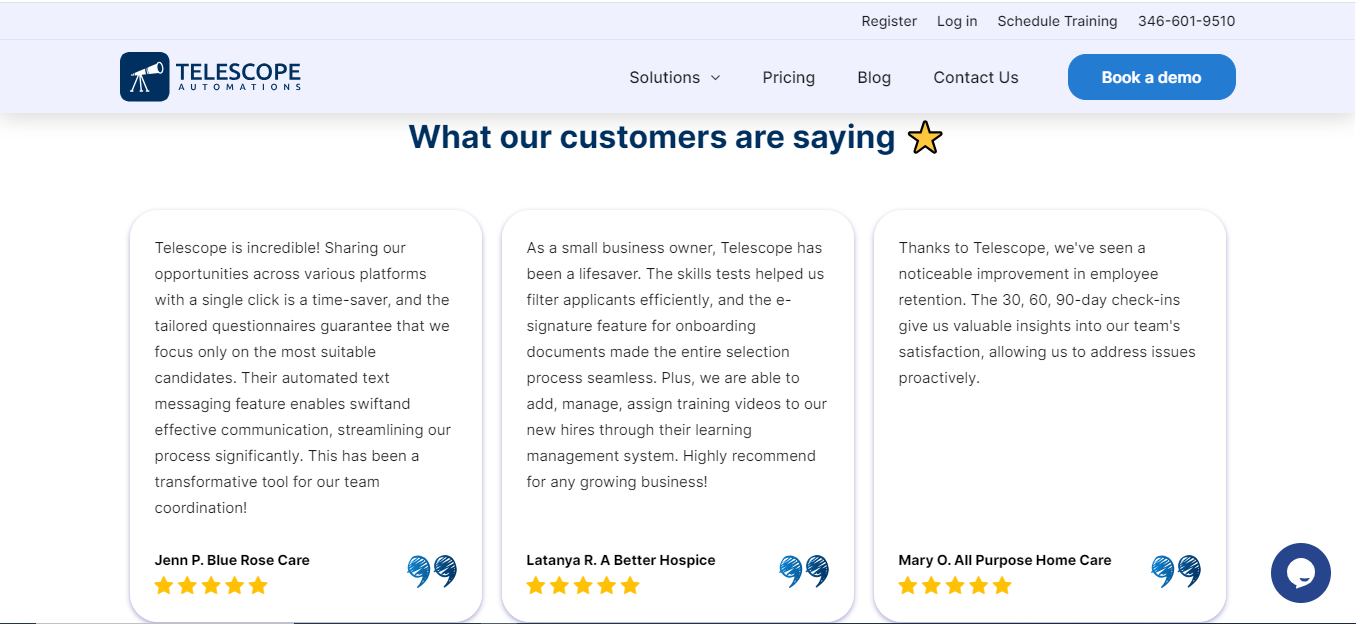
When was the last time you tried a new restaurant or hired a service without checking reviews? Just like any other consumer service today, home care prospects heavily rely on online reviews and testimonials to gauge whether an agency is trustworthy.
In marketing terms, these reviews are called social proof, and it’s incredibly influential. Research by BrightLocal shows that even in general consumer behavior, 88% of people trust online reviews as much as personal recommendations from friends. For home care agencies, this trust factor can make or break a deal with a new client.
So, how can you build and maintain a strong online reputation?
-
Encourage satisfied customers to leave reviews on Google, Yelp, and Caring.com.
-
Make it easy to leave a review, you can provide direct links to review sites.
-
Respond to every review (good or bad). A thoughtful response to negative feedback increases trust.
-
Showcase testimonials on your website and brochures.
8. Run Targeted Google Ads Campaigns
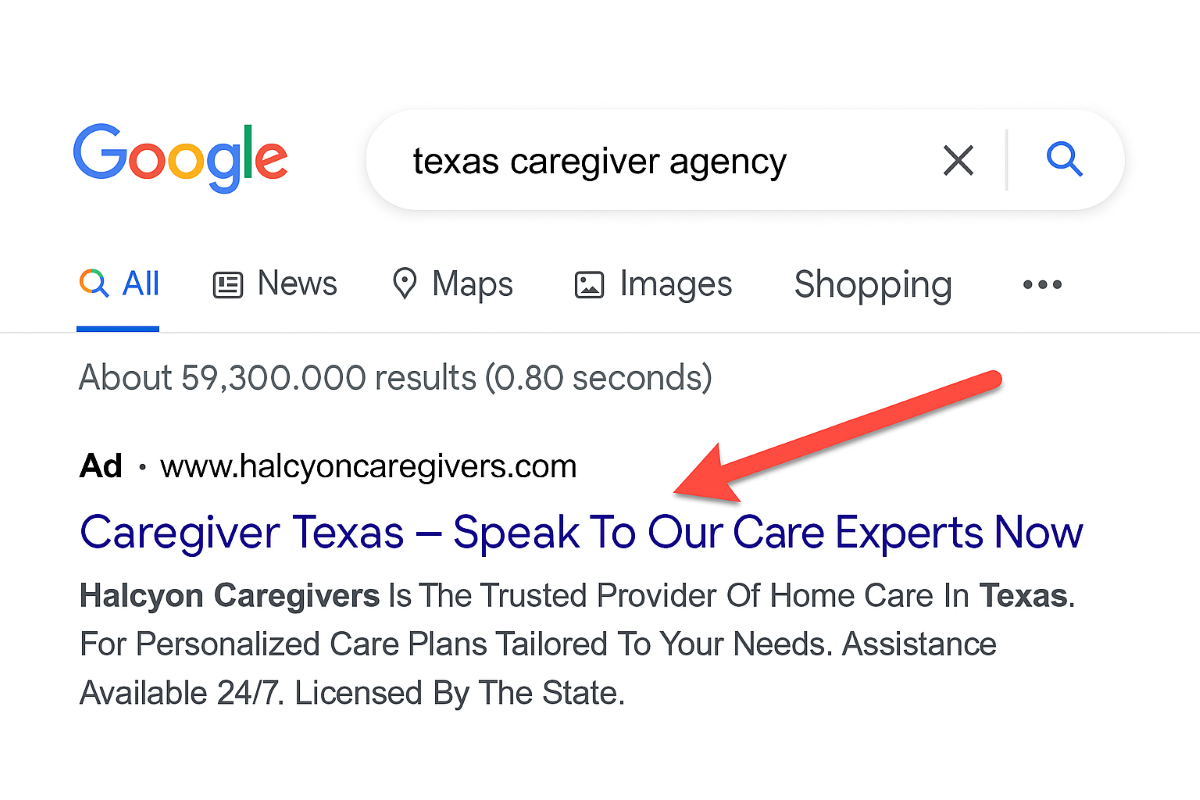
While building up your organic presence (SEO, content, etc.) is essential for the long run, sometimes you need an immediate boost in visibility. That’s exactly what home care marketing strategies that incorporate paid search advertising, specifically Google Ads, does.
With Google Ads (formerly AdWords), your home care agency can appear at the very top of Google search results for certain keywords. It appears even above the map listings – almost instantly, as long as you’re willing to bid and pay for those clicks. This can be very effective for capturing leads because you’re reaching people at the exact moment they’re searching for home care services.
To succeed in Google Ads,
-
Target the right high-intent keywords and locations.
-
Use geo-targeting to ensure ads only appear in your service areas.
-
Your ad copy should emphasize trust & experience, responsiveness, flexibility, and a clear call to action.
-
Optimize landing pages with easy contant options.
9. Use Facebook Ads and Retargeting to Stay on Prospects’ Radar
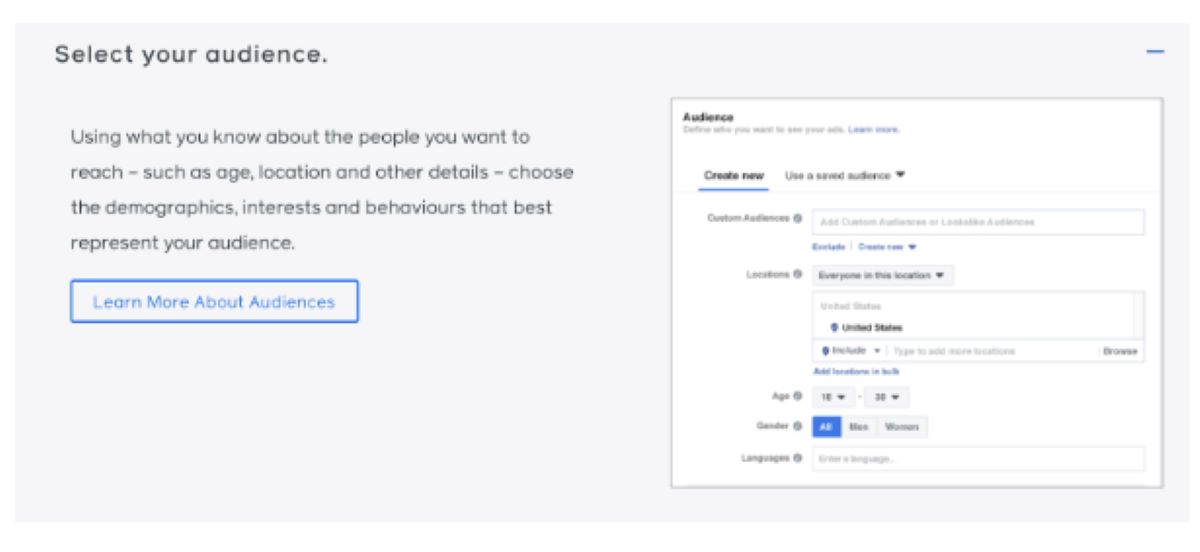
While Google Ads captures active searchers, Facebook Ads (and Instagram, since it’s the same platform) allow you to reach people who may not be searching yet but are likely to need your services.
The targeting capabilities of Facebook are perfect for home care’s local demographic. You can run ads that appear to users in your town or county who fall into certain age ranges or have expressed interest in elder care topics.
For example, you might target women aged 45-65 living within 20 miles of your location – a common profile for adult daughters caring for aging parents. By doing so, you get your name in front of the very people who either need help now or will need it soon.
One great use of Facebook Ads is to amplify the content you’ve already created. For instance, if you’ve written a blog post like “How to Talk to Your Aging Parents About Home Care,” promote it with a small budget to your local target audience. The post will show up as a sponsored item in their news feed, providing value (information) while also gently introducing them to your agency.
Essentially, you’re boosting your credibility and brand awareness with useful content rather than just a cold ad.
10. List Your Agency on Key Online Directories and Lead Sites
It’s the digital age. Naturally, many families turn to online senior care directories to find and compare home care providers, especially if they’re starting from scratch without personal recommendations.
Websites like Caring.com, SeniorAdvisor.com, A Place for Mom, and CareInHomes are popular platforms where your potential clients may go to read reviews and request information from multiple agencies at once. Getting your home care agency listed on these lead-generation sites can significantly increase your visibility and direct warm leads your way.
To make the most of these directories,
-
Claim or create your profile on them. Ensure all information is complete and accurate.
-
Encourage reviews. Many home care owners have reported that a good number of their new clients initially found them on such sites.
11. Participate in Community Events and Sponsorships

Never underestimate the power of old-fashioned community presence. Home care is a local, person-to-person business at its heart, and building your reputation in the community is one of the best home care marketing strategies that can directly lead to client inquiries.
One way to do this is by sponsoring or participating in local events. This could include health fairs, senior center activities, charity walks (like an Alzheimer’s Association walk), church gatherings focused on seniors, or holiday events for older adults.
By having a presence at these events, you increase awareness of your agency and put a friendly face to your company name. Sponsoring an event might mean donating funds or resources to help run it, in exchange for having your logo on the event materials or a table at the event. Even if you can’t afford a big sponsorship, simply networking with attendees and collecting contact information is valuable.
12. Host or Speak at Educational Workshops and Seminars
One of the most effective ways to market your expertise is by educating others. Home care is still a mystery to many families, they have questions about how it works, how to pay for it, how to choose a provider, and so on.
By offering free workshops or seminars on these topics, you accomplish two things: you establish yourself as a trusted expert, and you attract exactly the people who are likely to need your services. This marketing strategy can be done in-person or virtually (webinars), or a mix of both.
Here’s how you can go about it:
-
Partner with libraries, hospitals, or senior centers.
-
Offer non-salesy, educational talks like “How to Choose a Home Care Provider.”
-
Record webinars for later use on social media and your website.
Of course, at the end of the presentation, you can have a slide or handout with your agency’s information. You can also offer to answer questions about your services one-on-one. By giving value first, you earn the trust and attention of the audience without coming off as a sales pitch.
13. Advertise in Local Media (Print Still Works!)
While digital marketing strategies dominate, local advertising channels still work. Many seniors and their families continue to consume traditional media like newspapers, community magazines, radio, and even direct mail. These mediums can complement your digital efforts by reaching people where they are already looking or listening in their daily lives.
Local newspapers, especially community journals or senior-focused publications are a good example. A lot of adults (particularly older adults) still read the local paper every week to stay informed about community news. Placing an ad in those papers gets your services seen by readers who may not be actively searching online.
Therefore, it is a good strategy to
-
Run ads in local newspapers and magazines.
-
Consider community radio sponsorships.
-
Submit press releases about events or milestones.
14. Maintain a Strong and Consistent Brand Image
Branding isn’t just for big corporations, it matters for home care agencies, too. Your brand is essentially the story and image of your business that lives in people’s minds. It’s conveyed through your name, logo, colors, tagline, website design, tone of voice, and even the way your staff dresses or answers the phone.
For a service as personal as home care, a strong brand can set you apart from the pack of generic-sounding providers and show clients that you’re professional, trustworthy, and aligned with their values.
Start with the basics:
-
Use a consistent logo, colors, and tone across all materials.
-
Have a tagline that conveys your core message and values.
-
Ensure staff wear branded apparel to increase recognition.
-
Train caregivers on customer service to reinforce a positive image.
15. Track Your Marketing Efforts and Refine Your Strategy
Last but certainly not least, let’s talk about the importance of tracking results and continuously improving your marketing strategy.
You can implement all the home care marketing strategies mentioned here, but if you don’t measure what’s working and what’s not, you’ll have no idea where to focus your energy (or budget) going forward. Home care owners who take a data-informed approach to marketing will most certainly do better than those who rely on guesswork or never analyze their efforts.
Start with a simple question: How did you hear about us?
Train your intake staff to ask every new client this question (and note it in a spreadsheet or CRM). Over time, you’ll get a sense of which channels are consistently bringing in leads. Maybe you notice that 50% of clients say, “Oh, we found you on Google,” 20% say they were referred by a hospital social worker, 10% came from seeing your booth at an expo, etc.
This information is gold. It might reveal, for instance, that your effort on social media hasn’t yielded any direct clients yet, whereas your referrals from one assisted living partnership are booming. That doesn’t necessarily mean you abandon social media (some channels assist indirectly), but it does help you prioritize where to invest time and money.
As you collect data, don’t be afraid to adjust your strategy. Marketing is not a set-and-forget deal. As business guru Peter Drucker famously said, “What gets measured gets managed.” By measuring your marketing, you can manage it far more effectively.
Which of These Home Care Marketing Strategies Should You Try First?
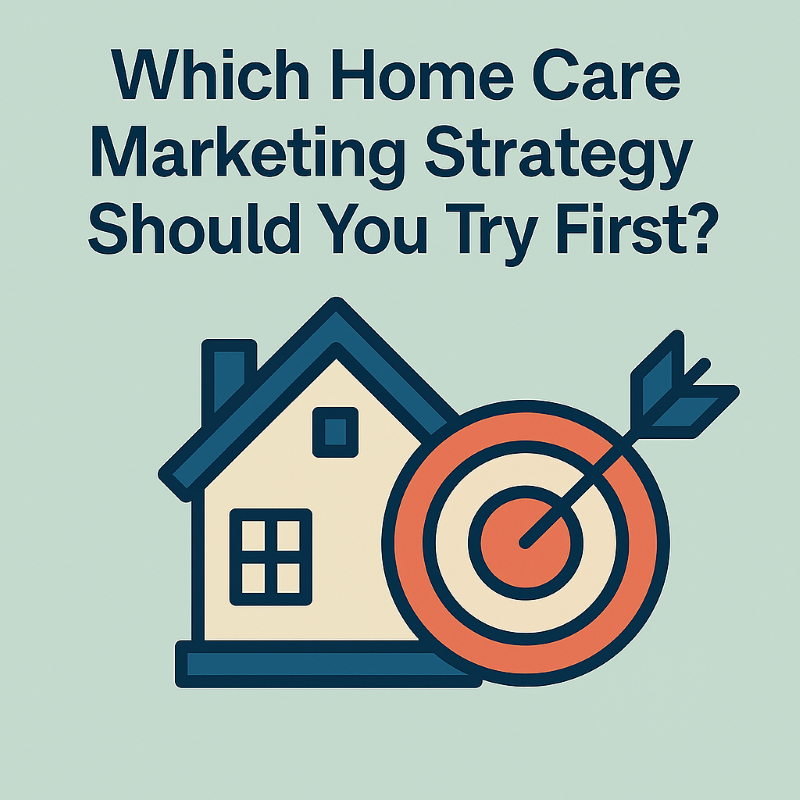
Looking at 15 different marketing strategies might feel like a lot. You might be wondering, “Where do I even start?” The truth is, you don’t need to do everything at once. Instead, focus on what will make the biggest impact right now based on your agency’s strengths, resources, and goals.
If you’re just starting out, you can begin with quick wins. Optimize your Google My Business listing, encourage client referrals, and get listed on online directories like Caring.com. These require minimal effort but can immediately increase your visibility.
If you’re struggling with trust and reputation, focus on collecting online reviews. Engage on social media, and build relationships with healthcare professionals who can refer clients to you. Families won’t choose a home care agency they don’t trust, so this step is very important.
If you already have a solid reputation and need consistent leads, invest in SEO, create helpful blog content, and consider Google or Facebook ads to reach potential clients actively searching for care.
Pick two or three strategies, track what works, and adjust as needed. The key is to start somewhere and build momentum over time.
Conclusion
Now, you’ve got 15 comprehensive home care marketing strategies needed to grow your business. Starting from digital tactics like SEO and social media, to traditional outreach like referrals and local events.
The key is to start with a plan, take action, track results, and adjust as needed. Marketing isn’t about doing everything at once, it’s about choosing the right steps at the right time to build trust, increase visibility, and keep a steady flow of new clients.
With the right approach, your home care agency will grow. Here’s to seeing your agency flourish through smart, strategic marketing – one relationship at a time!